|
|
|
|
#1
|
|||
|
|||
|
Hi Ed
You and I have had some interesting discussions regarding E90-1 cards these past 10 years . Glad to hear you still have your set. I put this 120-card set together in the mid-1990's. In recent years, when the price of the Joe Jax went "bananas", I broke up this set and sold 77 % of it. Shown below are 10 of the 28 cards I kept. Anyhow, none of these 28 cards have any of the so-called "plate scratches" on their backs. Not even the slightest trace of any "ink streaks". Furthermore, I compared notes with a fellow E90-1 collector nearby in Pennsylvania, who has a complete 120-card set (and approx. 60 dupes). And the only cards in his collection with "ink streaks" are Demmitt, Joss (portrait), Overall, Phelps, Stone (left arm), Jeff Sweeney & Roy Thomas. Also, he has an extra Joss (portrait) and Jeff Sweeney which do NOT have "ink streaks". Total = 208 cards. This results to only 3.3 % of this particular 208-card sample with this printing anomaly. In the past 25 years, I have seen many E90 cards, that I would venture to say a larger sample of these cards will yield even a lower percentage. Therefore, can we really rely on such inconsistencies in attempting to determine a valid sheet layout ? I don't think so. 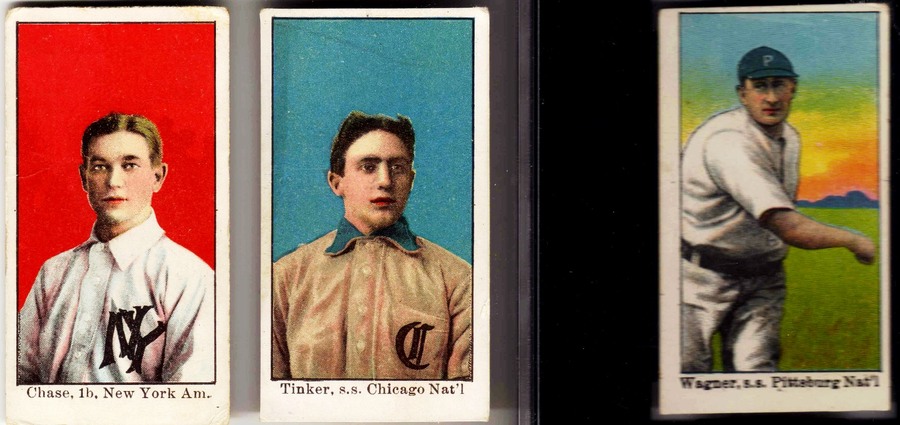 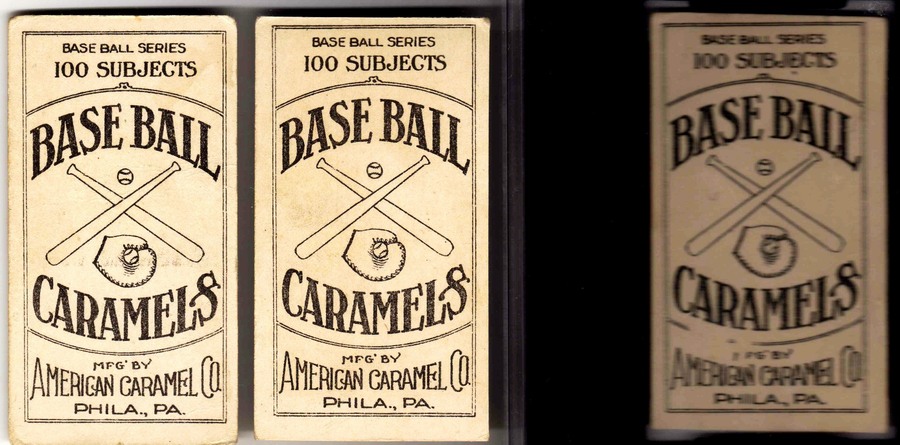  . .  . . 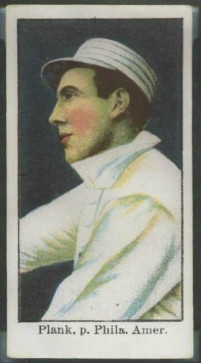 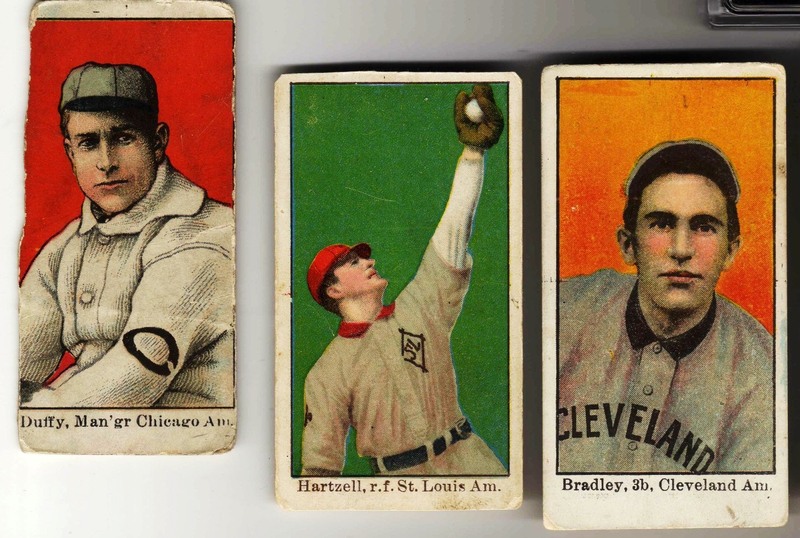 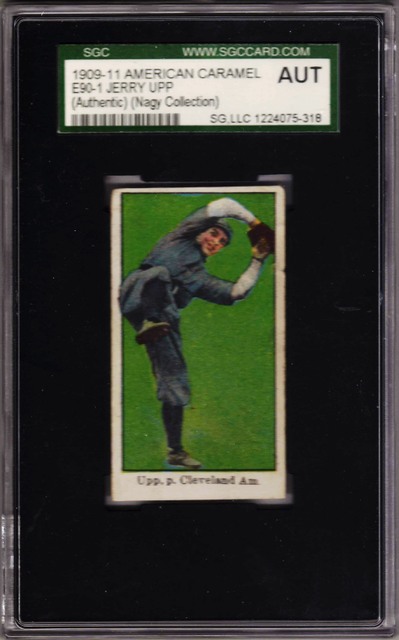 Incidentally, Ed......your sample percentage (4/125 = 3.2 %) coincides with the sample percentage that I noted above (3.3 %). TED Z . Last edited by tedzan; 11-26-2016 at 09:20 AM. Reason: Added "Incidentally, Ed......" |
|
#2
|
||||
|
||||
|
Here's One from Mr. Keeler...
The Plate Scratch Runs Across Mr. Keeler's Chest! Curious... Does Anyone Else See the # "2" On the Bottom RiGHT SiDe of His Shirt!? It's appears in the Black/White Area To the RiGHT, Under the "Y" From the N Y Insignia... If You Stare at it, the "2" Comes More ta Life! Reminds me of the old Cards, Where they ask You if You can See the Dog in the Picture!? Can You?
__________________
Life's Grand, Denny Walsh |
|
#3
|
||||
|
||||
|
Quote:
I have come across a few E90-1's with scratches through the front in my search. attachmentQ2KJX7I7.jpg |
|
#4
|
||||
|
||||
|
Quote:
Didn't Take You Long before You Found "The Dog"!  In Regards to Collecting E90-1 w/ Plate Scatches, Seems THeY FiND me more Often THaN I FiND THeM! I Guess we Need ta Move OVaR... Cause Here Come the T206 Guys  WHaT Do You Make of the "2" oN Mr. Keeler's Card? JuST Curious ta See if There are Any Who MiGHT Have an Opinion oN'em!? As Always...
__________________
Life's Grand, Denny Walsh |
|
#5
|
||||
|
||||
|
Hello Ted,
I was anticipating you'd weigh in on this thread, though I'd hoped your reply would be a more constructive one. I don't know if we'll ever be able to present a hypothetical E90-1 sheet from the scratches. Pat, as usual, has done some terrific work and we already have several dozen examples, including neighbors and matches. We've found evidence of double (or more) printing on a sheet, which surprised me considerably. At this point we lack the double name and ghost images that have helped advance the T206 research. We've only been at a week, and I remain hopeful that more evidence will surface, perhaps in a form we little expect. Reconstructing the sheet; or sheets, obviously; wasn't necessarily the ultimate goal of the project. My goal was merely a deeper understanding of the manner of distribution of E90-1s. It has been obvious to me for years that the long-held three series theory is woefully inadequate in explaining the varying levels of difficulty among the cards. A chance observation on a recent acquisition set us off on this voyage of discovery. Could I impose on you (or your friend) to post scans of the cards with scratches? I'm expecially interested to view the Demmitt to see if it matches any of the two we already have. Two of the finest E90-1 sets in existence reside right here in Western New York (mine is not one of them). I need to get those two to check their cards as well. And I hope that other evidence will continue to arrive, so we can advance this little project. Thanks again to everyone who has contributed so far; and expecially to Pat, whose work I continue to view with amazement. Keep 'em coming!
__________________
Please visit my website at http://t206.monkberry.com/index.html |
|
#6
|
||||
|
||||
|
Ed, Here's a scratch that's on three different subjects.
Clarke Matches Grant & Hartzell (Batting).jpgHartzell (Batting) 1.jpg Grant Matches Hartzell (Batting).jpg This Bender is one of only a few that has a left to right scratch, most of the scratches are right to left. Bender.jpg |
|
#7
|
||||
|
||||
|
Quote:
I know your post is directed at Ed but I would like to respond too. No offense but I don't think you understand the plate scratches. I would be happy to bring some plate scratch cards and meet with you sometime in the future and have a discussion. I'm not sure how they occurred but I think it probably happened in the moving of them in the printing process. Some of the stones were very large and I have seen pictures from around that time period where they were stored on racks similar to this. 1 Litography_archive_of_the_Bayerisches_Vermessungsamt.jpg 1 sl-374.jpg I'm sure a large number of sheets were printed before the scratches occurred and only a small number would have the scratches on them. Using this test sheet I made you can see only 25% of the cards have a scratch (9 out of 36). 1 E90-1 test sheet.jpg So combining this with the number of sheets that were printed before the scratch occurred would result in a low % although I think 3.3% is too low of an estimate. I think describing them as inconsistent is incorrect. The great thing about them is they are very consistent. A scratch on a subject from a particular sheet position is always in the same place. Here's multiple examples of a Seymour scratch. Seymour 1 Group Back.jpg Seymour 1 Group.jpg There are two on ebay right now with that same exact scratch. http://www.ebay.com/itm/1909-11-T206...cAAOSw3KFWchuH http://www.ebay.com/itm/1909-11-T206...4AAOSwnGJWSo7F That Seymour scratch is on this sheet. 1 Sheet%20F-B[2].jpg Here's the Seymour under that one. Seymour 2.jpg Seymour 1-Seymour 2.jpg Cicotte is next to Seymour on that sheet and Here's some of them. This Cicottte lines up with the Seymour's I posted above. Cicotte 1.jpg Cicotte 1-seymour.jpg This pair Cicotte 4.jpg Seymour 2.jpg Cicotte 4 -seymour 2.jpg And another pairing Cicotte 5.jpg Seymour 6.jpg Cicotte 5-Seymour 6.jpg And there's also a front mark that shows Cicotte and Seymour were next to each other on this sheet. 1 Seymour%20_5_ - Copy.jpg 1 Seymour [5] - Copy - Copy.jpg Last edited by Pat R; 11-26-2016 at 11:37 AM. |
|
#8
|
|||
|
|||
|
Quote:
Pat I fully understand what you refer to as "plate scratches". I've followed your posts regarding your Piedmont 150 analysis. Furthermore, when I was a teenager, I worked as an apprentice in a print shop and I am familiar with printing practices. I respect all the time & effort you have put into your T206 project. However, we are now talking about E90-1 cards. E90 cards were printed by a Lithographic firm in Philadelphia (1908-1910). The T206's were printed by American Litho (NYC) and it's my understanding that state-of-the-art rotary off-set presses were used to print these cards. I took the trouble of scanning Ebay's current listing of E90-1 cards. There are 178 unique E90-1 cards listed whose backs are visible in this listing. Only 7 of these cards exhibit "ink streaks"....resulting in 3.9 %. The grand total (of this group and the group noted in Post #36) is 386 samples. Only 14 of these cards have "ink streaks" resulting in a mere 3.6 %. I repeat: such a limited sampling (plus the varying characteristics of the "ink streaks") of these E90-1 cards certainly does not make for a reliable (or scientific) method for attempting to determine valid sheet layout, or series structure ? TED Z . |
|
#9
|
||||
|
||||
|
Quote:
I don't see how where they were printed makes a difference. A scratch is a scratch and where they were printed shouldn't factor into it. Neither should the %. If enough scratches are found to connect them and come up with a sheet or partial sheet layout it doesn't matter how many cards you have to look through to find them. I have saved scans from quite a few that are listed on ebay and there are a lot more than the seven you found. I didn't want to go back and look through all of them but I did look through a few pages and found twelve but I could only attach nine links. http://www.ebay.com/itm/1909-E90-1-A...sAAOSw4shX60qP http://www.ebay.com/itm/1909-E90-1-G...sAAOSwx2dYDj3P http://www.ebay.com/itm/1909-E90-1-A...8AAOSw9IpX1Jsl http://www.ebay.com/itm/1909-11-Amer...IAAMXQXZZReKdd http://www.ebay.com/itm/1909-E90-1-A...sAAOSwnDZT99lV http://www.ebay.com/itm/1909-E90-1-A...gAAOSwKrxUY311 http://www.ebay.com/itm/1909-E90-1-A...8AAOSwTA9X61yw http://www.ebay.com/itm/1909-E90-1-A...AAAOSwu4BVoUuB http://www.ebay.com/itm/1909-11-E90-...YAAOSwqfNXj~QP I also don't follow what you mean by varying ink streaks, they were caused by something scratching the surface it's not like someone drew a straight line through the back plate. Last edited by Pat R; 11-26-2016 at 08:35 PM. |
|
#10
|
||||
|
||||
|
It seems the only reason where something is mfg'd would be important will be if we can find the press that had the scratch or are able to put a sheet together by locating it? But generally I would agree that where a card is produced doesn't really help with where they were located on a sheet. Those scratches might help though....
Quote:
__________________
Leon Luckey www.luckeycards.com |
|
#11
|
|||
|
|||
|
Hi Ed
Sorry, that I interjected my opinion. After all the years we have known each other, we have had some meaningful discussions on this Candy set. But, my post appears to be causing problems; and, possibly alienating our friendship. But consider this....Including your data (125/4 "scratches") we have a total of 511 samples of E90-1 cards with only 18 examples of "ink streaks". This results in a mere 3.5 % with this anomaly from this large sample of cards. And it's considerably less percentage than the T206 Piedmont 150 data that Pat has analyzed. Therefore, the remark by some here...."what difference does it make" what printer (or machinery) was used to produce these E90-1 cards, is very naïve (if not uninformed). Anyway, I hope as you do that this survey may provide us some ideas of how the various series of this set were printed (1908 - Summer of 1910). This is a question you and I and others on this forum have discussed ever since I posted this E90-1 thread in March 2006...... http://www.net54baseball.com/showthread.php?t=89941 Take care......I am choosing to refrain from any further inputs to this thread. TED Z . |
|
#12
|
||||
|
||||
|
Ted,
Please understand that your posts in this thread in no way diminish my esteem for you as a collector or a friend. I apoolgize if my reply to you was interpreted in that way. Your experience and knowledge are a great resource in the hobby, and will be for many years to come. I invite you to keep an open mind as we progress in this venture and, of course, to add anything you feel might add to our knowledge. As i said previously, I have no idea if we'll be able to reconstruct an entire sheet or sheets, but we already have discovered several interesting and heretofore unknown facts about the configuration of the sheets and thererby a few clues as to the distribution of the set. Warmest Regards, Ed
__________________
Please visit my website at http://t206.monkberry.com/index.html |
|
#13
|
||||
|
||||
|
Ed, Here's another three subject match.
Crawford Matches Knight & Roy Thomas.jpgKnight.jpg Thomas ,Roy.jpg Fred Mitchell matches Joss Pitching. Mitchell, Fred.jpg Joss 2 B Back - Copy.jpg Last edited by Pat R; 11-27-2016 at 09:10 PM. Reason: Added Mitchell/Joss |
|
#14
|
|||
|
|||
|
Quote:
The percentage of cards showing marks from plate scratches or streaks is currently fairly low. This could be from a few things. It could be that collectively we've only looked at/for them for a brief time. Pat has pointed out a couple of the other limiting things. In comparison to the P150's there are fewer scratches so fewer cards from a sheet will be affected. And when the scratch happened will have a lot of bearing on the percentage found. I think it's simply too early to draw much of a conclusion from that percentage. The question of what sort of press produced the set is a good one. If they were produced on a then fairly cutting edge rotary offset press that used metal plates it opens up a lot of complications. The plates at the time were expensive and not simple to produce. http://sites.tech.uh.edu/digitalmedi...y_of_Litho.pdf I don't see a mention of them being saved for reuse, but it's possible they may have been as it was a fairly common thing with the stones. (Some were saved, others were resurfaced for reuse) If the plates were saved, they would be just as likely to be damaged as a stone. That damage might be different, as different accidents happen to large, inflexible heavy things than happen to light flexible things that happen to also be large. Diagonal streaks aren't all that likely on a rotary press. And consistent diagonal streaks are even less likely. Streaks parallel to the direction the sheet travels are likely, but these marks are not parallel to either a sheet run sideways or vertically. And a diagonal layout for rectangular objects would be really odd. Rotary offset plates can get scratched, just as stones can. I have a 1981 Fleer card with a nice red line from a plate scratch, and I'm very sure a rotary offset press was used. So to some extent the type of press used and how the printer handled the plates does matter. If plates weren't typically saved, consistent diagonal marks on series separated by time would most likely indicate a stone rather than plates. Another possibility would be the printing of various groups of fronts in different quantities either at the same time, or consecutively - group 1 Monday and Tuesday, group 2 Wednesday........with the backs printed last. I think that's unlikely, especially as one group typically shows flaws from dry or worn plates. (Using plates to include stones for simplicity) Even if the marks are indeed streaks, they're consistent enough to give us an idea of what cards were next to each other. There are fairly consistent streaks on more modern cards, once the rate the sheets were fed at got high enough static electricity became a problem, and the solution was dragging a string much like tinsel along the sheets being fed into the press. With proper drying in between colors, they shouldn't happen, but on a lot of 50's era cards they're common. I don't think the presses of the era, even rotary ones had a high enough rate. But some part of the press being loose might cause a streak. Personally I believe these are too consistent to be anything other than plate damage. Scratches most likely, but if it was a rotary press they could also be cracks, which would explain why they're less common. All in all, they're worth studying. Steve B |
|
#15
|
||||
|
||||
|
Hi Ed,
I haven't posted all of the scans that I have yet but here is a list of the scratches from all the input so far. There are 60 different scratches on 49 different subjects. Bailey Bender Bresnahan - matches Clement Chance Chase 2 Clarke (Philadelphia) - matches Grant and Hartzell (Batting) Clement - matches Bresnahan Cobb - 2 (two different scratches) Collins - matches Donavan Crawford - matches Knight and Roy Thomas Criger Demmitt 2 - matches Overall Donavan - matches Collins Engle 2 - matches Tenney Gibson (Front View) Grant - matches Clarke (Philadelphia) and Hartzell (Batting) Gray - matches McInnes Hartzell (Batting) - matches Clarke (Philadelphia) and Grant Howell (Follow Through) Howell (Wind-up) Jennings Joss (Portrait) 2 Joss (Pitching) 2 Keeler (Pink Background) Knight - matches Crawford and Roy Thomas Krause Lajoie - matches Marquard Lumley - matches Mathewson Marquard - matches Lajoie Mathewson 3 - Matches Lumley McInnes - matches Gray McQuillan Miller Mitchell, Fred Mullin Phelps 2 - matches Stone (Left Hand) Schlitzer Stone (Left Hand) - matches Phelps Stone (No Hands) 2 Summers Sweeney (New York) Tannehill, Jesse Tannehill, Lee Tenney - matches Engle Thomas, Roy - matches Crawford and Knight Thomas, Ira Tinker Wallace Last edited by Pat R; 11-29-2016 at 07:50 AM. |
|
#16
|
||||
|
||||
|
Originally Posted by tedzan View Post
But consider this....Including your data (125/4 "scratches") we have a total of 511 samples of E90-1 cards with only 18 examples of "ink streaks". This results in a mere 3.5 % with this anomaly from this large sample of cards. And it's considerably less percentage than the T206 Piedmont 150 data that Pat has analyzed. Therefore, the remark by some here...."what difference does it make" what printer (or machinery) was used to produce these E90-1 cards, is very naïve (if not uninformed). Anyway, I hope as you do that this survey may provide us some ideas of how the various series of this set were printed (1908 - Summer of 1910). This is a question you and I and others on this forum have discussed ever since I posted this E90-1 thread in March 2006...... http://www.net54baseball.com/showthread.php?t=89941 Take care......I am choosing to refrain from any further inputs to this thread. TED Z . Quote:
I think Ted misinterpreted what I said. I certainly think it's important how they were printed I was referring to where they were printed. In a few days it will be four years since you started the PD150 plate scratch thread. I have been tracking them through ebay and most of the auction houses since then and I can say without a doubt that so far the E90-1's are showing up at a higher %. If you look at past sales on cardtarget many of the E90-1's have sales with back scans in the single digits for a subject. On the other hand the majority of PD150 subjects have over 100 sales with back scans. I'm not sure if it has been established which company in Philadelphia printed the E90-1's but if it was George Harris and sons which I believe was the largest lithographic printer there at the time they were owned by American Lithograph. Last edited by Pat R; 11-29-2016 at 09:20 AM. |
|
#17
|
||||
|
||||
|
Seems We Have 3 Scratches Thru the Bat!
Pat R's 3rd Mr. Mathewson, Mike's Mr. Miller Fielding & my Mr. Stone's(LHV)! I Wonder if We Keep Studying these if we Would Eventually be Able to Figure Out Weather THeY Came From the East or West Coast Produced Cards!? Or at Least Separate the Production SiGHTs!? I do Believe THaT Mr. Mark MaCrae 's Deep Due Diligence has brought ta LiGHT Sum Really Cool Evidence! (imho anyways)
__________________
Life's Grand, Denny Walsh |
|
#18
|
||||
|
||||
|
It's been 1 1/2 years since the last post in this thread but here are a
few new ones to add to the list. Bradley E90-1.jpg E90-1 Brown.jpg E90-1 Jennings.jpg Miller E90-1 B.jpg Keeler E90-1.jpg There are two new chase scratches this one Chase E90-1 4.jpg and this one which is also an exact match with a new Clarke scratch Chase E90-1 3.jpg Clarke E90-1.jpg Chase E90-1 3 - Copy.jpg some of the scratches are hard to see with the smaller scans you can veiw larger scans using this link all of the newer scratches are at the end of the album. https://imageevent.com/patrickr/e901platescratches?n=0 |
|
#19
|
||||
|
||||
|
These are my only two E90-1s with plate scratches. Both are Tannehills, I have a couple others without. Sorry, doesn't appear that these are new additions to your list

__________________
Collection on Flickr: https://www.flickr.com/photos/139478047@N03/albums |
|
#20
|
||||
|
||||
|
New one in Scott's auction a Groom that matches one of the Mathewson's
and one of the Stone (left hands). E90-1 Groom.jpg E90-1 Mathewson.jpgE90-1 Stone.jpg |
 |
|
|
 Similar Threads
Similar Threads
|
||||
| Thread | Thread Starter | Forum | Replies | Last Post |
| Just would not measure up at the plate..... | Brian Van Horn | Net54baseball Vintage (WWII & Older) Baseball Cards & New Member Introductions | 6 | 04-10-2015 07:59 PM |
| Can anyone identify these chicken scratches? | slidekellyslide | Autograph Forum- Primarily Sports | 10 | 01-27-2013 02:38 PM |
| Scratches on PSA cases | kmac32 | Net54baseball Vintage (WWII & Older) Baseball Cards & New Member Introductions | 4 | 08-23-2012 07:16 AM |
| Scratches on SGC/PSA cases | Archive | Net54baseball Vintage (WWII & Older) Baseball Cards & New Member Introductions | 6 | 02-17-2009 01:46 PM |
| Remove Scratches from SGC and PSA cases? | Archive | Net54baseball Vintage (WWII & Older) Baseball Cards & New Member Introductions | 15 | 03-07-2007 08:39 PM |